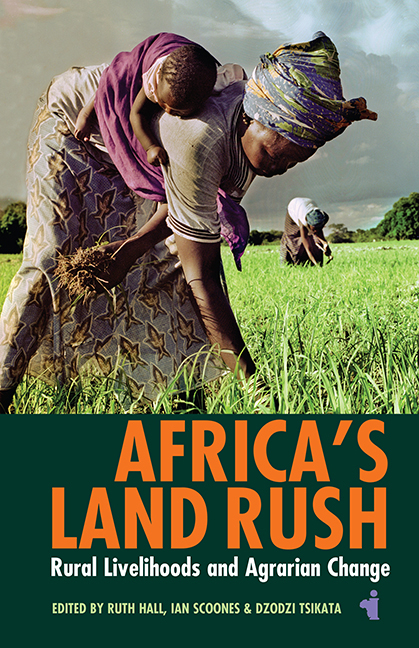Book contents
- Frontmatter
- Contents
- List of Maps, Tables & Figures
- Notes on Contributors
- Preface
- Acknowledgements
- List of Abbreviations
- 1 Introduction: The Contexts & Consequences of Africa’s Land Rush
- 2 State, Land & Agricultural Commercialisation in Kwara State, Nigeria
- 3 Recent Transnational Land Deals & the Local Agrarian Economy in Ghana
- 4 Large-Scale Land Acquisitions in Ethiopia: Implications for Agricultural Transformation & Livelihood Security
- 5 Land Deals & Pastoralist Livelihoods in Laikipia County, Kenya
- 6 Land Deals in the Tana Delta, Kenya
- 7 The State & Foreign Capital in Agricultural Commercialisation: The Case of Tanzania’s Kilombero Sugar Company
- 8 Trapped between the Farm Input Subsidy Programme & the Green Belt Initiative: Malawi’s Contemporary Agrarian Political Economy
- 9 Agrarian Struggles in Mozambique: Insights from Sugarcane Plantations
- 10 South African Commercial Farmers in the Congo
- References
- Index
2 - State, Land &Agricultural Commercialisation in Kwara State, Nigeria
Published online by Cambridge University Press: 21 May 2021
- Frontmatter
- Contents
- List of Maps, Tables & Figures
- Notes on Contributors
- Preface
- Acknowledgements
- List of Abbreviations
- 1 Introduction: The Contexts & Consequences of Africa’s Land Rush
- 2 State, Land & Agricultural Commercialisation in Kwara State, Nigeria
- 3 Recent Transnational Land Deals & the Local Agrarian Economy in Ghana
- 4 Large-Scale Land Acquisitions in Ethiopia: Implications for Agricultural Transformation & Livelihood Security
- 5 Land Deals & Pastoralist Livelihoods in Laikipia County, Kenya
- 6 Land Deals in the Tana Delta, Kenya
- 7 The State & Foreign Capital in Agricultural Commercialisation: The Case of Tanzania’s Kilombero Sugar Company
- 8 Trapped between the Farm Input Subsidy Programme & the Green Belt Initiative: Malawi’s Contemporary Agrarian Political Economy
- 9 Agrarian Struggles in Mozambique: Insights from Sugarcane Plantations
- 10 South African Commercial Farmers in the Congo
- References
- Index
Summary
Introduction
The World Bank has identified Africa's Guinea Savanna agro-ecological zone as the world's largest under-developed agricultural resource (World Bank 2009). Kwara State, part of Nigeria's ‘Middle Belt’, lies within this zone. It has a relatively low population density and extensive rotational fallow-farming systems are used. Kwara has in recent years been the site of experimentation in large-scale commercial agriculture, involving Zimbabwean and local farmers, in a project known as the Shonga Farms, named for the location at Shonga Town in the district of the same name. The initiative is driven by the Kwara State government, as part of a policy to modernise agriculture and to contribute to national food security as well as creating employment. This chapter examines the experience gained from the Shonga experiment, and assesses its implications for agricultural policy.
History of land appropriation by government in Nigeria
The state has been directly involved in land matters since the creation of modern Nigeria, which brought together incumbent land tenure structures and subjected them to the ultimate suzerainty of the state. Pre-existing forms of land tenure include the Muslim Maliki code of law (in Northern Nigeria), traditional Family Land (in the south of the country) and other pre-Islamic and traditional forms. The result of suzerainty was a dualistic tenure system in which a distinction was made between statutory and customary law, where the state recognised customary rights of use, but reserved for itself the right of appropriation of urban and ‘development’ land. This right was devolved to the state governments and compensation was paid only for loss of economic crops and ‘betterment’ (meaning buildings and other fixed investments).
In the 1970s, faced with the difficulty of acquiring land for public purposes – especially in southern Nigeria where family land rights were strongly upheld – and following a high-powered national review of land issues (Mabogunje 2009), the (then) military government issued a Land Use Decree (now the Land Use Act of 1978). Intended as a means of ensuring easier access to land for government and (ostensibly) for individuals, the Act forms part of the Constitution, meaning that it cannot be easily amended or discarded.
- Type
- Chapter
- Information
- Africa's Land RushRural Livelihoods and Agrarian Change, pp. 30 - 45Publisher: Boydell & BrewerPrint publication year: 2015
- 2
- Cited by



